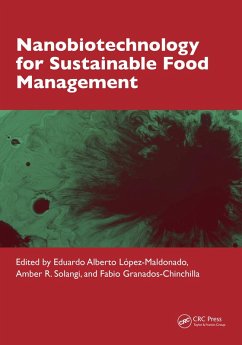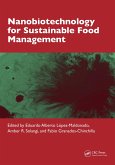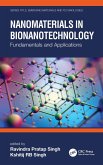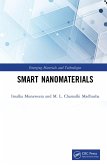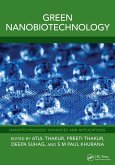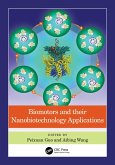Nanobiotechnology for Sustainable Food Management (eBook, PDF)
Redaktion: López-Maldonado, Eduardo Alberto; Granados-Chinchilla, Fabio; Solangi, Amber R.
52,95 €
52,95 €
inkl. MwSt.
Sofort per Download lieferbar

26 °P sammeln
52,95 €
Als Download kaufen

52,95 €
inkl. MwSt.
Sofort per Download lieferbar

26 °P sammeln
Jetzt verschenken
Alle Infos zum eBook verschenken
52,95 €
inkl. MwSt.
Sofort per Download lieferbar
Alle Infos zum eBook verschenken

26 °P sammeln
Nanobiotechnology for Sustainable Food Management (eBook, PDF)
Redaktion: López-Maldonado, Eduardo Alberto; Granados-Chinchilla, Fabio; Solangi, Amber R.
- Format: PDF
- Merkliste
- Auf die Merkliste
- Bewerten Bewerten
- Teilen
- Produkt teilen
- Produkterinnerung
- Produkterinnerung

Bitte loggen Sie sich zunächst in Ihr Kundenkonto ein oder registrieren Sie sich bei
bücher.de, um das eBook-Abo tolino select nutzen zu können.
Hier können Sie sich einloggen
Hier können Sie sich einloggen
Sie sind bereits eingeloggt. Klicken Sie auf 2. tolino select Abo, um fortzufahren.

Bitte loggen Sie sich zunächst in Ihr Kundenkonto ein oder registrieren Sie sich bei bücher.de, um das eBook-Abo tolino select nutzen zu können.
In this book, the role of nanobiotechnology in food which includes quality control and safety through nanosensors and biosensors, targeted delivery of nutrients, controlled release of nutrients, proteins, antioxidants, and ¿avors through encapsulation and enzymatic reactions for food forti¿cation of fat-soluble compounds is discussed.
- Geräte: PC
- mit Kopierschutz
- eBook Hilfe
Andere Kunden interessierten sich auch für
![Nanobiotechnology for Sustainable Food Management (eBook, ePUB) Nanobiotechnology for Sustainable Food Management (eBook, ePUB)]() Nanobiotechnology for Sustainable Food Management (eBook, ePUB)52,95 €
Nanobiotechnology for Sustainable Food Management (eBook, ePUB)52,95 €![Nanomaterials in Bionanotechnology (eBook, PDF) Nanomaterials in Bionanotechnology (eBook, PDF)]() Nanomaterials in Bionanotechnology (eBook, PDF)55,95 €
Nanomaterials in Bionanotechnology (eBook, PDF)55,95 €![Nanopesticides, Nanoherbicides, and Nanofertilizers (eBook, PDF) Nanopesticides, Nanoherbicides, and Nanofertilizers (eBook, PDF)]() Nanopesticides, Nanoherbicides, and Nanofertilizers (eBook, PDF)131,95 €
Nanopesticides, Nanoherbicides, and Nanofertilizers (eBook, PDF)131,95 €![Nano Physical Pharmaceutics (eBook, PDF) Nano Physical Pharmaceutics (eBook, PDF)]() Nano Physical Pharmaceutics (eBook, PDF)146,95 €
Nano Physical Pharmaceutics (eBook, PDF)146,95 €![Smart Nanomaterials (eBook, PDF) Smart Nanomaterials (eBook, PDF)]() Imalka MunaweeraSmart Nanomaterials (eBook, PDF)52,95 €
Imalka MunaweeraSmart Nanomaterials (eBook, PDF)52,95 €![Green Nanobiotechnology (eBook, PDF) Green Nanobiotechnology (eBook, PDF)]() Green Nanobiotechnology (eBook, PDF)168,95 €
Green Nanobiotechnology (eBook, PDF)168,95 €![Biomotors and their Nanobiotechnology Applications (eBook, PDF) Biomotors and their Nanobiotechnology Applications (eBook, PDF)]() Biomotors and their Nanobiotechnology Applications (eBook, PDF)49,95 €
Biomotors and their Nanobiotechnology Applications (eBook, PDF)49,95 €-
-
-
In this book, the role of nanobiotechnology in food which includes quality control and safety through nanosensors and biosensors, targeted delivery of nutrients, controlled release of nutrients, proteins, antioxidants, and ¿avors through encapsulation and enzymatic reactions for food forti¿cation of fat-soluble compounds is discussed.
Dieser Download kann aus rechtlichen Gründen nur mit Rechnungsadresse in A, B, BG, CY, CZ, D, DK, EW, E, FIN, F, GR, HR, H, IRL, I, LT, L, LR, M, NL, PL, P, R, S, SLO, SK ausgeliefert werden.
Produktdetails
- Produktdetails
- Verlag: Taylor & Francis eBooks
- Seitenzahl: 400
- Erscheinungstermin: 25. Oktober 2024
- Englisch
- ISBN-13: 9781040130506
- Artikelnr.: 72295338
- Verlag: Taylor & Francis eBooks
- Seitenzahl: 400
- Erscheinungstermin: 25. Oktober 2024
- Englisch
- ISBN-13: 9781040130506
- Artikelnr.: 72295338
- Herstellerkennzeichnung Die Herstellerinformationen sind derzeit nicht verfügbar.
Eduardo López¿Maldonado, a distinguished academic, holds a BSc. in Chemical Engineering (2009) and a PhD. in Chemical Sciences (2012) from the National Technological Institute of MexicöTijuana, Center for Graduates and Research in Chemistry. His doctoral thesis, a groundbreaking piece of applied scientific research in collaboration with a semiconductor company in Tijuana's industrial zone, earned him the prestigious Mexican Society of Electrochemistry's Best Doctoral Thesis award in 2013. The same year, Dr. López¿Maldonado joined the research staff at the Center for Research and Technological Development in Electrochemistry (CIDETEQ) S.C., Tijuana Branch, where he began his research career. His work there involved projects centered on the extraction and properties of natural biopolymers as coagulating, flocculating, and chelating agents. Dr. López¿Maldonado's impressive track record includes extensive experience in basic and applied science research projects with industries at the regional and national levels. He is recognized as a member of the Researchers National System and has served as a facilitator of the Environmental Leadership Program for Competitiveness (PLAC), organized by SEMARNAT and PROFEPA. Dr. López¿Maldonado has presented at national and international conferences focusing on Polymer Chemistry, Sustainable process development, Environment, and Nanotechnology. Currently, Dr. López¿Maldonado is a full¿time professor¿researcher in the Faculty of Chemical Sciences and Engineering at the Autonomous University of Baja California, where he leads the Biopolyelectrolyte Engineering Research line. Amber R. Solangi is a full Professor at the National Centre of Excellence in Analytical Chemistry (NCEAC), University of Sindh, Jamshoro, Pakistan. She earned her Ph.D. from the NCEAC, University of Sindh, Jamshoro, in 2007 and a Post¿Doc at the School of Chemistry, Monash University, Melbourne, Australia (2009-2010). Her field of expertise encompasses the innovative development of methodologies for identifying and removing environmental pollutants from aqueous systems. She also excels in synthesizing and utilizing nanomaterials/nanocomposites to fabricate cutting¿edge sensors. Dr. Solangi has effectively supervised the research thesis of 10 Ph.D. and 30 M.Phil students. Her significant contributions include publishing 106 research papers in esteemed and reputable scientific journals with high impact factors. She has also authored four book chapters in books published with reputed publishers. She has delivered invited/oral talks at 16 international conferences abroad and 28 national conferences in Pakistan. Dr. Solangi has received seven international trainings. She has also organized six workshops/seminars at NCEAC. She maintains active membership in several distinguished national and international scientific societies, including a Fellowship of the Chemical Society of Pakistan, the Soil Science Society of Pakistan, the American Chemical Society, the American Society for Microbiology, USA, and the International Society for Development & Sustainability, Japan. Dr. Solangi's impactful achievements also encompass the successful completion of four projects funded by the Higher Education Commission of Pakistan, Islamabad, and Sindh Higher Education Commission, Karachi, Pakistan. Fabio Granados¿Chinchilla holds a B.Sc. Chemistry (in 2008) and M.Sc. Microbiology with emphasis in Bacteriology (in 2016) from the Universidad de Costa Rica. He worked extensively in feed and food research, with over 13 years of experience in food analysis, including safety, quality, natural products, liquid and gas chromatography, and mass spectrometry. He also worked in the implementation of pesticide residue analysis and the optimization and creation of methods for the determination of antimicrobials in environmental and food matrices. He has vast experience in determining mineral profiles (including heavy metal analysis) in complex matrices, including feed, foods, and food ingredients. His research also includes antimicrobial and mycotoxin analysis and method development for food and feed matrices, including cereals, milk, and compound feed. His main research interests include bacterial antibiotic resistance, chromatography, analytical chemistry, food and feed quality, food and feed safety, and contaminant and residue analysis. He is a regular member of the American Society for Microbiology, ASM (since 2013) and a student member of the American Chemical Society, ACS (since 2012). Currently, he fills a position as an instructor of organic chemistry laboratory undergrad courses for the Faculty of Basic Sciences and the School of Chemistry. He also occupies a research position in the Faculty of Microbiology and the Centre for Research in Tropical Diseases at the Universidad de Costa Rica. He has been a reviewer for over 30 internationally recognized and indexed prestigious scientific journals and contributed to over 50 research items (including articles and book chapters).
1. Nanobiotechnological Techniques Available in Food Science 2.
Nanotechnology in Food Safety 3. Nanotechnology in Food Production and
Management 4. Nanotechnology in Food Processing 5. Nanotechnology in Food
Packaging 6. Nanotechnology for Food Preservation, Security, and
Biosecurity 7. Sensors Applied within the Food Industry 8. Safety Issues
and Regulatory Challenges of Nanoproducts in Food 9. Environmental Impacts
of Nanoparticles 10. Nanotechnology in Food Processing 11. Nanotechnology
in Food Packaging 12. Nanotechnology Principles for the Detection of
Foodborne Bacterial Pathogens and Toxins 13. Nanotechnology in the
Detection of Food Contaminants 14. Nanotechnology Approaches in Food
Adulterant and Spoilage Detection 15. Nanosensors Applied Within the Food
Industry: The Role of Volatile Organic Compounds Sensing 16. Safety Issues
and Regulatory Challenges of Nanoproducts in Food 17. Environmental Impact
of Nanoparticles
Nanotechnology in Food Safety 3. Nanotechnology in Food Production and
Management 4. Nanotechnology in Food Processing 5. Nanotechnology in Food
Packaging 6. Nanotechnology for Food Preservation, Security, and
Biosecurity 7. Sensors Applied within the Food Industry 8. Safety Issues
and Regulatory Challenges of Nanoproducts in Food 9. Environmental Impacts
of Nanoparticles 10. Nanotechnology in Food Processing 11. Nanotechnology
in Food Packaging 12. Nanotechnology Principles for the Detection of
Foodborne Bacterial Pathogens and Toxins 13. Nanotechnology in the
Detection of Food Contaminants 14. Nanotechnology Approaches in Food
Adulterant and Spoilage Detection 15. Nanosensors Applied Within the Food
Industry: The Role of Volatile Organic Compounds Sensing 16. Safety Issues
and Regulatory Challenges of Nanoproducts in Food 17. Environmental Impact
of Nanoparticles
1. Nanobiotechnological Techniques Available in Food Science 2.
Nanotechnology in Food Safety 3. Nanotechnology in Food Production and
Management 4. Nanotechnology in Food Processing 5. Nanotechnology in Food
Packaging 6. Nanotechnology for Food Preservation, Security, and
Biosecurity 7. Sensors Applied within the Food Industry 8. Safety Issues
and Regulatory Challenges of Nanoproducts in Food 9. Environmental Impacts
of Nanoparticles 10. Nanotechnology in Food Processing 11. Nanotechnology
in Food Packaging 12. Nanotechnology Principles for the Detection of
Foodborne Bacterial Pathogens and Toxins 13. Nanotechnology in the
Detection of Food Contaminants 14. Nanotechnology Approaches in Food
Adulterant and Spoilage Detection 15. Nanosensors Applied Within the Food
Industry: The Role of Volatile Organic Compounds Sensing 16. Safety Issues
and Regulatory Challenges of Nanoproducts in Food 17. Environmental Impact
of Nanoparticles
Nanotechnology in Food Safety 3. Nanotechnology in Food Production and
Management 4. Nanotechnology in Food Processing 5. Nanotechnology in Food
Packaging 6. Nanotechnology for Food Preservation, Security, and
Biosecurity 7. Sensors Applied within the Food Industry 8. Safety Issues
and Regulatory Challenges of Nanoproducts in Food 9. Environmental Impacts
of Nanoparticles 10. Nanotechnology in Food Processing 11. Nanotechnology
in Food Packaging 12. Nanotechnology Principles for the Detection of
Foodborne Bacterial Pathogens and Toxins 13. Nanotechnology in the
Detection of Food Contaminants 14. Nanotechnology Approaches in Food
Adulterant and Spoilage Detection 15. Nanosensors Applied Within the Food
Industry: The Role of Volatile Organic Compounds Sensing 16. Safety Issues
and Regulatory Challenges of Nanoproducts in Food 17. Environmental Impact
of Nanoparticles
